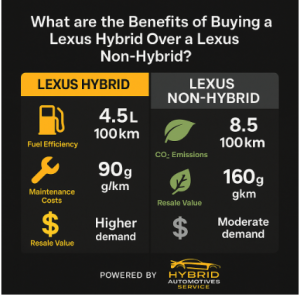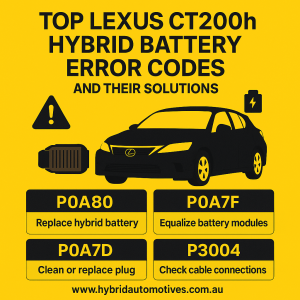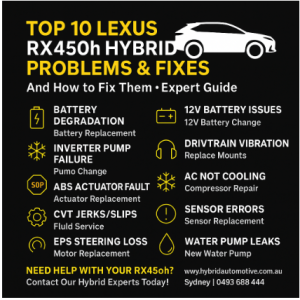
Toyota Aqua Hybrid Battery Problems: Causes, Symptoms & Solutions
Toyota Aqua Hybrid Battery Problems: Causes & Solutions
The Toyota Aqua, also known as the Toyota Prius C in some markets, is one of the most popular compact hybrid vehicles worldwide. It’s well-loved for its affordability, fuel efficiency, and practicality in city driving. However, like all hybrid cars, the Aqua is not free from challenges—especially when it comes to its hybrid battery system.

As the Aqua ages and accumulates mileage, owners often report different types of Toyota Aqua hybrid battery problems. Understanding the causes, early signs, and practical solutions is key to maintaining performance and avoiding expensive repairs.
In this article, we’ll cover the most common Toyota Aqua Hybrid Battery issues, their causes, cost-effective solutions, and ways to extend your battery’s life.
Common Toyota Aqua Hybrid Battery Problems
Rapid Battery Drain
One of the most frequent complaints from Aqua owners is that the Aqua Hybrid Battery drains quickly. This usually happens when the battery cells start losing capacity over time. Instead of holding charge efficiently, the system cycles between charging and discharging too quickly.
Warning Lights & “Check Hybrid System” Error
A common red flag is when the dashboard displays the “Check Hybrid System” warning light. This error can be triggered by a failing battery, inverter problems, or ECU malfunctions. If ignored, it can lead to further hybrid system damage.
Reduced Fuel Efficiency
The Aqua is designed for fuel savings, but a weak battery puts more strain on the petrol engine. This results in lower fuel economy, which often frustrates owners who bought the Aqua to save money on fuel.
Difficulty Starting the Car
Another clear sign of a deteriorating hybrid battery is when the Aqua struggles to start or fails completely. This is because the hybrid system relies heavily on battery power during startup.
Overheating Issues
If the hybrid battery cooling fan becomes clogged with dust and debris, it can cause the battery to overheat. Overheating not only reduces efficiency but also shortens the overall lifespan of the battery pack.
Causes of Toyota Aqua Hybrid Battery Problems
Age & Mileage of the Vehicle
Most Toyota Aqua hybrid batteries last between 6–10 years or around 150,000 km, depending on usage. Once the cells reach their natural end of life, problems start appearing.
Harsh Climate Conditions
Both extreme heat and freezing cold can damage battery cells. In hot climates, batteries overheat quickly, while in cold weather, they struggle to charge efficiently.
Poor Maintenance & Delayed Servicing
Ignoring hybrid servicing schedules can accelerate battery wear. For example, failing to clean the cooling fan can cause overheating and premature failure.
Faulty Hybrid System Components
Sometimes the battery itself is fine, but related parts such as the inverter, ECU, or voltage sensors cause problems. A proper hybrid diagnostic test is necessary to confirm the actual cause.
Manufacturing Defects in Certain Models
While rare, some Aqua models may develop problems earlier due to factory-related defects. These issues often lead to recalls or early battery replacements.
Solutions for Toyota Aqua Hybrid Battery Problems
Regular Hybrid System Diagnostics
Running a diagnostic check using Toyota Techstream or other OBD-II tools helps detect problems before they worsen. Regular inspections allow mechanics to spot failing cells early.
Cleaning & Maintaining the Cooling Fan
One of the simplest yet most overlooked solutions is to clean the battery cooling fan every 12–18 months. A clean fan ensures proper airflow, preventing overheating issues.
Reconditioning Toyota Aqua Hybrid Battery Packs
Battery reconditioning is a cost-effective solution where weak modules are replaced or rebalanced. This can restore up to 80–90% of battery performance at a fraction of the replacement cost.
When to Replace the Battery
If your Aqua shows consistent issues such as “Check Hybrid System” warnings, poor fuel economy, or frequent stalling, it may be time for a full battery replacement.
Choosing the Right Battery
When replacing, you typically have three options:
- OEM (Original Toyota Battery): Reliable but expensive.
- Aftermarket Battery: More affordable, good for budget-conscious owners.
- Rebuilt/Reconditioned Battery: Cost-effective, usually with a shorter warranty.
Toyota Aqua Hybrid Battery Replacement: Cost & Options
The cost of replacing a Toyota Aqua hybrid battery varies depending on the region:
- Australia: AUD $1,200 – $2,000
- New Zealand: NZD $1,000 – $1,800
- Japan: JPY 150,000 – 250,000
Reconditioned batteries are significantly cheaper but may only last 2–3 years, while OEM replacements can last 6–8 years with proper care. Many service providers also offer 2-year or 100,000 km warranties for peace of mind.
How to Prevent Toyota Aqua Hybrid Battery Problems
- Service Regularly: Schedule hybrid system checkups at least once a year.
- Clean the Cooling Fan: Prevent overheating by keeping airflow clear.
- Drive Regularly: Avoid leaving the Aqua unused for long periods, as idle batteries degrade faster.
- Adopt Smooth Driving Habits: Sudden acceleration and heavy braking reduce battery life.
- Avoid Deep Discharge: Try not to run the battery too low before charging cycles.
Is the Toyota Aqua Still Reliable Despite Battery Problems?
Absolutely! While battery problems are among the most common issues, they are not unique to the Aqua—all hybrid cars eventually face them. The Toyota Aqua remains one of the most reliable and economical hybrid cars in the compact segment.
With regular maintenance, proper care, and timely battery replacement when needed, your Toyota Aqua can easily serve you well beyond 200,000 km.




